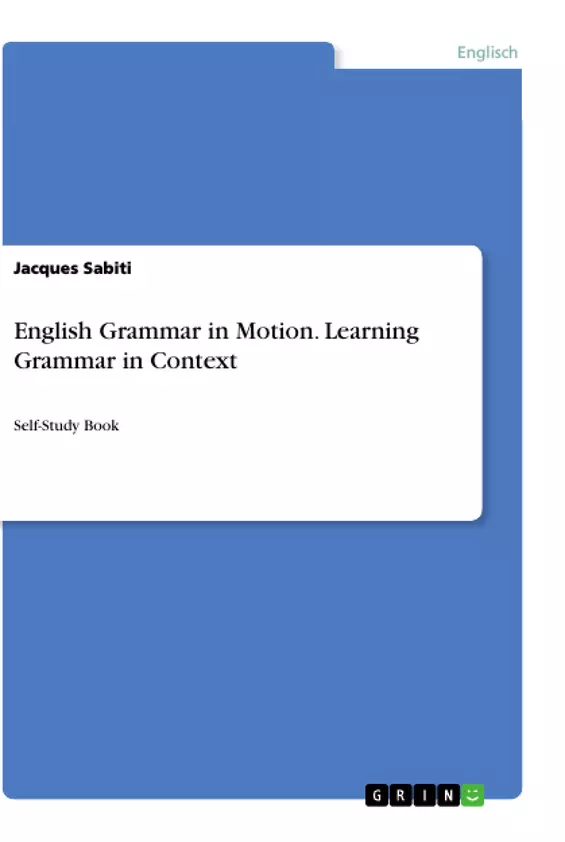This is a self-study book intended to help contextualize English grammar structures. Learning grammar in context is more important as a language is learned for communication purposes. This book contains twenty-seven units. Each unit tackles a particular grammar structure. Not all grammar structures are handled. Based on the author’s teaching experience, the structures under discussion were deemed more important than others. They were selected, responding to students’ needs (students as second language learners) suiting the teaching to their needs.
Those grammar structures are contextualized in self-created dialogues and examples bank (different sentences or passages from other scholars’ works). Each unit is subdivided into different activities. Some units have more activities than others, depending on their weight. But no unit counts less than three activities. The first common activity is about reading self-created dialogues to learn about how a given grammar structure is used in context.
The second common activity is about perusing different sentences and passages from other scholars’ publications. The example banks serve as a proof to the reader that it is not only the writer who used the structures in context, but also many other researchers. It also ensures the reader that there is no difference between the way the writer uses the structures and other scholars. Furthermore, the example banks motivate students to learn English alongside with other subjects, bearing in mind that they cannot fully grasp the subjects they are doing in English without mastering general English.
The last common activity is about using the same structure in the reader’s own texts. After reading through writer’s dialogues, and then perusing examples bank to see how other scholars used a given grammar structure, the reader can produce his/her own texts to check her/his understanding of the structure under discussion.
Inhaltsverzeichnis
- UNIT ONE: QUANTITATIVE ADJECTIVES.
- UNIT TWO: HOW OFTEN/HOW MUCH/ HOW MANY/HOW FAR/ HOW TALL, HOW LONG
- UNIT THREE: COMPARATIVE AND SUPERLATIVE ADJECTIVES.
- UNIT FOUR: CORRELATIVE CONJUNCTIONS
- UNIT SIX: POSSESSIVE PRONOUNS..
- UNIT SEVEN: DO AND MAKE……………………..
- UNIT EIGHT: QUESTION TAGS
- UNIT NINE: RELATIVE PRONOUNS
- UNIT TEN: REPORTING QUESTIONS WITH QUESTION WORDS..
- UNIT ELEVEN: INFINITIVES
- UNIT TWELVE: WANT/ GET & HAVE+OBJECT+ADJECTIVE and OTHER USES ....
- UNIT THIRTEEN: GERUNDS
- UNIT FOURTEEN: NOT DOING and NOT TO DO..
- UNIT FIFTEEN: ELSE / PREFER..
- UNIT SIXTEEN: ADJECTIVES AND ABSTRACT NOUNS..
- UNIT SEVENTEEN: THE USE OF ADVERBS ENDING IN '-LY'
- UNIT EIGHTEEN: PREPOSITIONS
- UNIT NINETEEN: EXPRESSING PURPOSE & REASON OR CONSEQUENCES& CONCESSION AND CONTRAST
- UNIT TWENTY: ELLIPSES WITH SUBORDINATING CONJUNCTIONS...
- UNIT TWENTY ONE: PERFECT MODALS…..
- UNIT TWENTY TWO: WHATEVER/WHENEVER/ HOWEVER/WHOEVER/WHATSOEVER/ WHEREVER
- UNIT TWENTY THREE: IT'S TIME…../ I WISH…………../ I'D RATHER..
- UNIT TWENTY FOUR: TOO.......TO/SO ....... .THAT.
- UNIT TWENTY FIVE: INVERSION USE.
- UNIT TWENTY SIX: Present and Past participles
- UNIT TWENTY SEVEN: HYPHENATED COMPOUND ADJECTIVES..
Zielsetzung und Themenschwerpunkte
Dieses Buch ist ein Selbstlernkurs, der dazu dient, verschiedene Grammatikstrukturen in ihrem Kontext zu veranschaulichen. Das Erlernen von Grammatik im Kontext ist wichtiger, da eine Sprache zum Zwecke der Kommunikation gelernt wird. Die Hauptidee des Buches ist, dass das Erlernen von Grammatik im Kontext den Lernenden hilft, Grammatikstrukturen effektiver zu verstehen und anzuwenden.
- Grammatik im Kontext lernen
- Selbstgestaltete Dialoge und Beispiele
- Praktische Anwendung von Grammatikstrukturen
- Verbesserung der Fähigkeit, Englisch in verschiedenen Kontexten zu verwenden
- Zusammenhang zwischen Grammatik und alltäglicher Kommunikation
Zusammenfassung der Kapitel
Das Buch umfasst 27 Einheiten, die jeweils eine bestimmte Grammatikstruktur behandeln. Jede Einheit ist in verschiedene Aktivitäten unterteilt, darunter das Lesen von Dialogen, das Analysieren von Beispielen aus anderen Publikationen und das Anwenden der erlernten Grammatikstrukturen in eigenen Texten. Einige Einheiten beinhalten zusätzliche Aktivitäten, wie z. B. einen Test zum Wissen über die jeweilige Grammatikstruktur, um den Lernenden die Möglichkeit zu geben, ihre Fähigkeiten zu überprüfen und zu verbessern.
Schlüsselwörter
Die wichtigsten Schlüsselwörter und Themenschwerpunkte des Buches sind: Grammatik, Kontextlernen, Selbstlernen, Dialog, Beispiele, Englisch als Fremdsprache, Kommunikation, praktische Anwendung, Schreiben, Übungen.
Häufig gestellte Fragen zu English Grammar in Motion
Warum ist das Erlernen von Grammatik im Kontext wichtig?
Sprache dient der Kommunikation. Grammatik im Kontext zu lernen hilft dabei, nicht nur Regeln auswendig zu lernen, sondern zu verstehen, wie diese Strukturen in realen Gesprächen und Texten tatsächlich angewendet werden.
Wie ist eine Lerneinheit in diesem Buch aufgebaut?
Jede der 27 Einheiten besteht aus drei Hauptaktivitäten: dem Lesen von Dialogen, dem Analysieren von Beispielen aus wissenschaftlichen Werken (Example Banks) und der Produktion eigener Texte.
Was sind die "Example Banks" im Buch?
Dies sind Sammlungen von Sätzen und Passagen anderer Wissenschaftler. Sie dienen als Beweis dafür, dass die gelernten Strukturen in der Fachliteratur weit verbreitet sind, und motivieren dazu, Englisch fachübergreifend zu lernen.
Welche Grammatikthemen werden unter anderem behandelt?
Das Buch deckt Themen ab wie quantitative Adjektive, Relativpronomen, Gerundien, Infinitive, Modalverben, Inversionen und die Verwendung von Adverben auf '-ly'.
Für wen ist dieses Buch besonders geeignet?
Es ist als Selbstlernbuch konzipiert, das sich besonders an Lernende richtet, die Englisch als Zweitsprache (L2) erwerben und ihre kommunikativen Fähigkeiten sowie ihr Verständnis für akademische Texte verbessern wollen.
Wie hilft das Buch bei der eigenen Textproduktion?
Die letzte Aktivität jeder Einheit fordert den Leser auf, die behandelte Struktur in eigenen Texten anzuwenden. Dies festigt das Verständnis und fördert die Sicherheit in der schriftlichen Kommunikation.
- Citar trabajo
- Jacques Sabiti (Autor), 2021, English Grammar in Motion. Learning Grammar in Context, Múnich, GRIN Verlag, https://www.grin.com/document/984550



